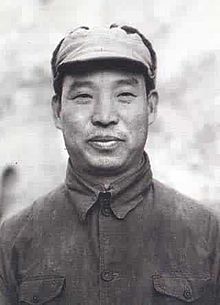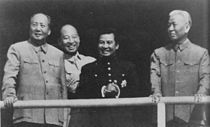Peng Zhen
This article needs additional citations for verification. (March 2013) |
You can help expand this article with text translated from the corresponding article in Chinese. (March 2023) Click [show] for important translation instructions.
|
Peng Zhen | |
|---|---|
| 彭真 | |
 Peng in 1945 | |
| 4th Chairman of the Standing Committee of the National People's Congress | |
| In office June 17, 1983 – April 8, 1988 | |
| Preceded by | Ye Jianying |
| Succeeded by | Wan Li |
| 1st Secretary of the Central Political and Legal Affairs Commission | |
| In office March 1980 – May 1983 | |
| Preceded by | Office Created |
| Succeeded by | Chen Pixian |
| First Secretary of the Beijing Committee of the Chinese Communist Party | |
| In office December 13, 1948 – May 1966 | |
| Preceded by | Office created |
| Succeeded by | Li Xuefeng |
| Personal details | |
| Born | October 12, 1902 Houma, Shanxi, China |
| Died | April 26, 1997 (aged 94) Beijing, China |
| Political party | Chinese Communist Party (1923–1997) |
| Spouse | Zhang Jieqing |
| Peng Zhen | |||||||||
|---|---|---|---|---|---|---|---|---|---|
| Chinese | 彭真 | ||||||||
| |||||||||
Peng Zhen (pronounced [pʰə̌ŋ ʈʂə́n]; October 12, 1902 – April 26, 1997) was a leading member of the Chinese Communist Party. He led the party organization in Beijing following the victory of the Communists in the Chinese Civil War in 1949, but was purged during the Cultural Revolution for opposing Mao's views on the role of literature in relation to the state. He was rehabilitated under Deng Xiaoping in 1982 along with other 'wrongly accused' officials, and became the inaugural head of the Central Political and Legal Affairs Commission.
Biography
[edit]

Born in Houma, Shanxi province, Peng was originally named Fu Maogong (傅懋恭). He joined the Chinese Communist Party (CCP) in 1923 as a founding member of the Shanxi Province CCP. Arrested in 1929, he continued underground political activities while imprisoned. He was released from prison in 1935 and began organizing a resistance movement against the invading Japanese forces. Peng was important in developing the Second United Front during the Second Sino-Japanese War.[1]: 145 Around the same time, he was appointed the Organization Department Director of the North Bureau of CCP.
Peng also served on a number of positions as vice-president of the Central Party School and director of the CCP Policy Research Office. In 1945 he served in the history research committee and the organizing committee of the CCP's 7th National Congress.
In September 1945 Peng was sent by Mao Zedong to take up overall leadership of the CCP in Northeast China. He was accompanied by Lin Biao who was to assist Peng with directing military operations against the Nationalists. Peng decided that the CCP could hold the 3 big cities of the Northeast: Shenyang, Changchun and Harbin. When the Nationalists under the command of Du Yuming attacked in November 1945, the Communists were forced back. Peng was removed as the CCP leader in the northeast after further failure by Lin Biao's forces in March 1946 led to the Communists retreat back to Harbin.[2]
Peng was a member of the CCP Central Committee starting from 1944 as well as a member of the Secretariat of the CCP Central Committee. He also held the positions of First Secretary of the Beijing Municipal Committee, and Mayor of Beijing from 1951 to 1966. In addition to being mayor, he was a high-ranking member of the Politburo from 1956 to 1966. In June 1960, he attended Bucharest Conference of Representatives of Communist and Workers Parties, countering Soviet leader Khrushchev during the conference.
Peng was appointed head of the Five Man Group in charge of preparing a "cultural revolution", but he fell out of favor with Mao Zedong in April 1966 when he attacked Mao's belief that all literature should support the state. He was accused of being an associate to Wu Han's counter-revolutionary clique and deposed at a May 1966 conference in what became the opening act of the Cultural Revolution. Lu Dingyi, Luo Ruiqing and Yang Shangkun were also deposed.
Peng survived the Cultural Revolution, and was eventually rehabilitated under Deng Xiaoping. He subsequently became Secretary of the Central Political and Legal Affairs Commission, a post he already held from late 1950s in the capacity of leader of a Central Politics and Law Leading Group. Beginning in 1983, as Chairman of the Standing Committee of the Sixth National People's Congress, he sought to increase the NPC's power. He used the NPC as a base to oppose reform.[3]: 196 In January 1987, Peng Zhen played a pivotal role in Hu Yaobang's resignation as General Secretary by attack and criticizing Hu during a meeting. Peng left Politburo after the 13th Party Congress in November 1987 and retired from politics in March 1988 after Wan Li took over his position as Chairman of Standing Committee of the National People's Congress.
During the 1989 Tiananmen Square protests and massacre, Peng Zhen supported the declaration of martial law in Beijing and the removal of Zhao Ziyang.
Peng Zhen died on April 26, 1997, from blood cancer aged 94, two months after the death of former vice premier Deng Xiaoping, and was eulogized with high honours by the highest organs of the party and the state. His official obituary declared him a "great proletarian revolutionary, politician, and outstanding expert in the affairs of the state; unswerving Marxist, instrumental in laying the foundations of legal institution in our country, and excellent leader of the party and state." The obituary also curiously made mention of his support of Deng Xiaoping's 1992 "southern tour" which re-ignited economic reforms after relative stagnation following the 1989 Tiananmen Square protests and massacre.[4]
He was considered one of the Eight Elders of the CCP.[citation needed]
Awards and honors
[edit] Knight Grand Cross of the Royal Order of Sowathara (Cambodia, 1956)[5]
Knight Grand Cross of the Royal Order of Sowathara (Cambodia, 1956)[5] First Class of the Order of the National Flag (North Korea, 1962)[6]
First Class of the Order of the National Flag (North Korea, 1962)[6]
References
[edit]Citations
[edit]- ^ Opper, Marc (2020). People's Wars in China, Malaya, and Vietnam. Ann Arbor: University of Michigan Press. doi:10.3998/mpub.11413902. ISBN 978-0-472-90125-8. JSTOR 10.3998/mpub.11413902.
- ^ Tanner, Harold M. (2012). "Big Army Groups, Standardisation, and Assaulting Fortified Positions: Chinese Ways of Warfare and the Transition from Guerilla to Conventional War in China's Northeast, 1945 - 1948". Journal of Chinese Military History. One (Two): 111–113.
- ^ Joseph Fewsmith, China since Tiananmen, Cambridge University Press. 2009
- ^ "彭真同志逝世讣告".
- ^ 柬埔寨国王赠予毛主席周总理最高勋章. People's Daily. 1956-02-09: 1.
- ^ 象征中朝人民互相支持并肩作战的伟大友谊 朝最高人民会议授予彭真一级国旗勋章. People's Daily. 1962-05-03: 1.
Sources
[edit]- Original text based on marxists.org article (GNU FDL)
Further reading
[edit]- Pitman B. Potter, From Leninist Discipline to Socialist Legalism: Peng Zhen on Law and Political Authority in the PRC, Stanford University Press; 1 edition (March 13, 2003), hardcover: 272 pages, ISBN 0804745005 ISBN 978-0804745000
External links
[edit]- 1902 births
- 1997 deaths
- 20th-century mayors of places in China
- Politicians from Linfen
- Victims of the Cultural Revolution
- Chinese Communist Party politicians from Shanxi
- Chairmen of the Standing Committee of the National People's Congress
- Vice Chairpersons of the National Committee of the Chinese People's Political Consultative Conference
- Mayors of Beijing
- People's Republic of China politicians from Shanxi
- Members of the Secretariat of the Chinese Communist Party
- Members of the 12th Politburo of the Chinese Communist Party
- Members of the 11th Politburo of the Chinese Communist Party
- Members of the 8th Politburo of the Chinese Communist Party
- Members of the 7th Politburo of the Chinese Communist Party
- Burials at Babaoshan Revolutionary Cemetery
